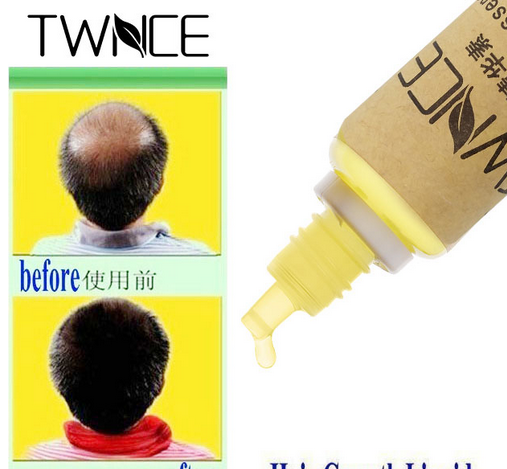TWNCE Hair Growth Essence Hair Loss Liquid 20ml dense hair fast sunburst grow Restoration pilatory b
EditAvoiding Damaging your Hair
EditCaring Actively for your Hair
EditEating Right for Healthy Hair


 Eat enough protein. Protein is essential for strong hair. A deficiency in protein can lead to dry and weak hair, and ultimately, hair loss.[23] Adequate protein can help to provide the amino acids that strengthen hair. It is often included in shampoos, but it's protein from your diet that will help improve the condition of your hair and prevent hair loss if you eat it in large enough quantities.
Eat enough protein. Protein is essential for strong hair. A deficiency in protein can lead to dry and weak hair, and ultimately, hair loss.[23] Adequate protein can help to provide the amino acids that strengthen hair. It is often included in shampoos, but it's protein from your diet that will help improve the condition of your hair and prevent hair loss if you eat it in large enough quantities.- Get protein by eating seafood, poultry, milk, cheese, yogurt, eggs, beans, pork tenderloin, soy, lean beef, and protein bars.[24]
- Vegans, dairy-free consumers, and others can get good non-animal protein from tempeh, tofu, whole wheat bread, peanut butter, brown rice, lentils, quinoa, nuts, seitan, beans, and broccoli.[25]






EditSeeking Medical Help for Hair Loss
 Know when to visit the doctor. It's important to know when your hair loss could be a symptom of a more serious medical complaint, in which case you should see a doctor as soon as possible. Contact a doctor if you are losing hair in an unusual pattern, or rapidly at an early age, such as in your teen or twenties.[37] Other symptoms to look out for are:
Know when to visit the doctor. It's important to know when your hair loss could be a symptom of a more serious medical complaint, in which case you should see a doctor as soon as possible. Contact a doctor if you are losing hair in an unusual pattern, or rapidly at an early age, such as in your teen or twenties.[37] Other symptoms to look out for are:- Pain and itching with hair loss, or a red, scaly scalp.
- You have bald spots on your beard or eyebrows.
- If you are a woman and you are experiencing male pattern baldness, abnormal hair growth on your face and body, or an irregular menstrual cycle. There may be an underlying hormonal disorder responsible for your hair loss.
- You have been gaining weight, suffering fatigue, muscle weakness, or intolerance to cold temperatures.[38]

 Know the treatments for men. Hereditary-pattern baldness is the most common cause of hair loss. In men, it is most commonly characterised by a receding hairline that forms a rough "M" shape. Although it is not a disease and is based on your genes, there are treatments that your doctor can prescribe to you.[41] The two medications most commonly used are:
Know the treatments for men. Hereditary-pattern baldness is the most common cause of hair loss. In men, it is most commonly characterised by a receding hairline that forms a rough "M" shape. Although it is not a disease and is based on your genes, there are treatments that your doctor can prescribe to you.[41] The two medications most commonly used are:- Minoxidil (Rogaine) is a topical solution that is applied to the scalp to stimulate hair follicles. It comes in 2% and 5% solutions and is applied once daily.
- Finasteride (Propecia, Proscar) is a pill that interferes with the production of a form of testosterone that is linked to baldness.[42] Women of child-bearing age should not touch or handle crushed or broken tablets.
 Know the treatments for women. About a third of women experience some hair loss. As many as two thirds of menopausal women experience hair thinning or bald patches. Women rarely suffer a receding hairline, but a thinning at the part line develops into increasing diffuse hair on the top of the head.[43] Some of the most common medications for female pattern hair loss include:
Know the treatments for women. About a third of women experience some hair loss. As many as two thirds of menopausal women experience hair thinning or bald patches. Women rarely suffer a receding hairline, but a thinning at the part line develops into increasing diffuse hair on the top of the head.[43] Some of the most common medications for female pattern hair loss include:- Minoxidil (Rogaine) is applied topically and massaged into the scalp. Minoxidil is excreted in breast milk following oral administration, so it should not be used while breastfeeding.
- Anti-androgens are receptor-blocking drugs which are only very rarely prescribed.
- Iron supplements are prescribed for some women, especially vegetarians, those with a history of anemia, or those who have heavy menstrual bleeding.[44]


























No comments:
Post a Comment